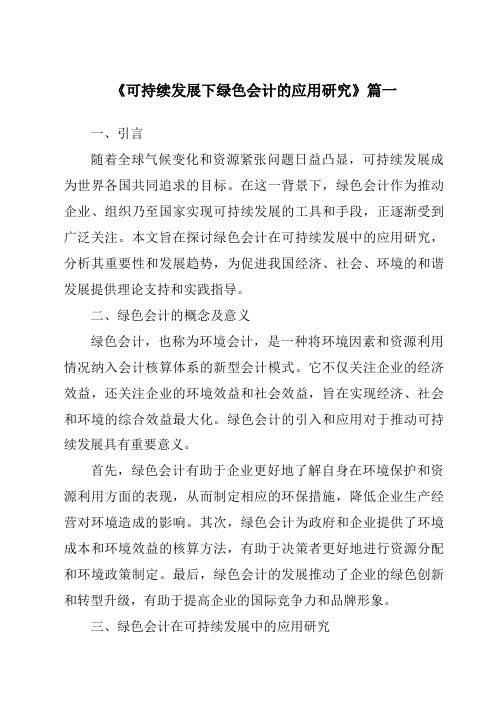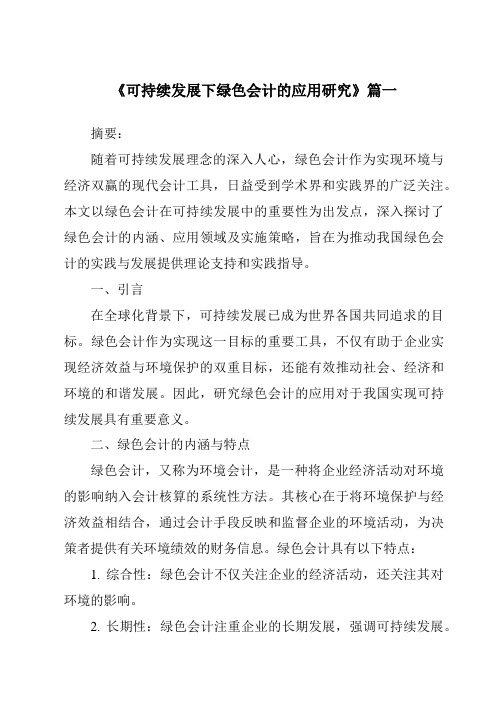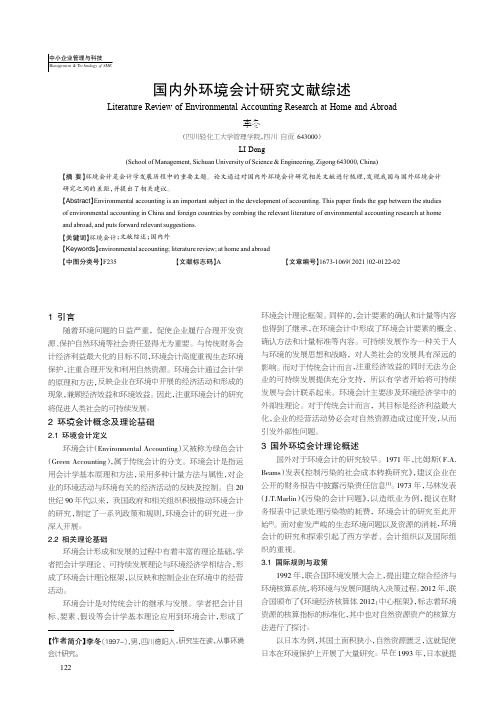可持续发展下绿色会计国外文献综述
《2024年可持续发展下绿色会计的应用研究》范文

《可持续发展下绿色会计的应用研究》篇一一、引言随着全球气候变化和资源紧张问题日益凸显,可持续发展成为世界各国共同追求的目标。
在这一背景下,绿色会计作为推动企业、组织乃至国家实现可持续发展的工具和手段,正逐渐受到广泛关注。
本文旨在探讨绿色会计在可持续发展中的应用研究,分析其重要性和发展趋势,为促进我国经济、社会、环境的和谐发展提供理论支持和实践指导。
二、绿色会计的概念及意义绿色会计,也称为环境会计,是一种将环境因素和资源利用情况纳入会计核算体系的新型会计模式。
它不仅关注企业的经济效益,还关注企业的环境效益和社会效益,旨在实现经济、社会和环境的综合效益最大化。
绿色会计的引入和应用对于推动可持续发展具有重要意义。
首先,绿色会计有助于企业更好地了解自身在环境保护和资源利用方面的表现,从而制定相应的环保措施,降低企业生产经营对环境造成的影响。
其次,绿色会计为政府和企业提供了环境成本和环境效益的核算方法,有助于决策者更好地进行资源分配和环境政策制定。
最后,绿色会计的发展推动了企业的绿色创新和转型升级,有助于提高企业的国际竞争力和品牌形象。
三、绿色会计在可持续发展中的应用研究1. 绿色会计在企业的应用企业是实施绿色会计的主要载体。
通过建立绿色会计体系,企业可以更好地了解自身在生产经营过程中对环境的影响,从而采取相应的环保措施。
例如,企业可以通过绿色会计核算自身的碳排放量、能源消耗等环境成本,进而制定减排降耗的计划和措施。
同时,绿色会计还可以帮助企业核算自身的环境效益,如节能减排、生态保护等方面的成果,从而提高企业的社会责任感和品牌形象。
2. 绿色会计在政府的应用政府是推动绿色发展的重要力量。
通过制定绿色会计政策和标准,政府可以引导和规范企业的环保行为,推动绿色产业的发展。
此外,政府还可以通过绿色会计核算国家或地区的资源环境成本和环境效益,从而制定科学合理的环保政策和措施。
这些政策和措施不仅有助于保护生态环境,还可以促进经济的可持续发展。
绿色会计研究文献综述

2112019年6月 营销界(第3周)绿色会计研究文献综述■张勇 张子龙(张勇,大华(集团)有限公司;张子龙,萍乡学院)随着我国经济的快速发展,经济发展和生态环境的平衡问题得到了更大的关注,我们在发展经济的同时,更加注重环境的保护。
2015年修订出台的《环境保护法》,2018年开始实施的《环境保护税法》等法律法规都标志着我国对环境保护的重视上升到新的高度。
从过往的经验得知,合理的财务制度是可以平衡经济发展和环境保护,因此,总结国内外学者关于绿色会计领域的研究成果,使其应用到我国的经济发展和环境保护,意义重大。
一、绿色会计的内涵绿色会计又称为环境会计,它是在传统会计核算方法的基础上,通过货币计量的方式对环境方面带来的成本费用以及收益进行确认、计量、记录和报告,通过这些行为可以比较准确的评估出企业的行为带来综合的财务状况、经营成果和现金流量。
世界上最早开始把环境问题和会计相结合的研究是1971年的F.A.Beams 和1973年的 J.T.Marlin,他们的最初研究发表在文章《控制污染的社会成本转换研究》和《污染的会计问题》,这两篇文章标志着绿色会计的诞生。
到了20世纪80年代,由于环境问题的进一步恶化,世界各国对绿色会计更加重视,但是,只有美国、日本等为代表的一小部分发达国家建立了绿色会计制度,但是这些绿色会计制度并不完善,同时也缺少理论上的指导。
与发达国家相比,虽然我国对于环境问题一直很重视,但是绿色会计的发展在我国仍然比较滞后,直到20世纪90年代初期,学者葛家澍和李若山的文章《九十年代西方会计理论的一个新思潮—绿色会计理论》发表后才标志着我国绿色会计研究的开始,到近十年,绿色会计的研究才逐步深入。
二、绿色会计的文献综述(1)绿色会计理论体系研究方面。
姚翠(2010)认为要把自然资源和生态资源包括在企业会计的核算和监督之内,为了确保绿色会计信息质量,还要引入环境审计,事后的环境评价,把环境评估也纳入到企业的综合评估之内,这样才能够让企业、社会和自然环境的发展可持续。
绿色会计理论与可持续发展外文文献翻译

毕业设计附件外文文献翻译:原文+译文文献出处: Markus S. Green accounting theory and sustainable development [J]. Accounting, Auditing & Accountability Journal, 2016, 2(1): 29-46.原文Green accounting theory and sustainable developmentMarkus SAbstractGreen accounting, also known as environmental accounting, combining accounting and natural environment, the diversity of measurement methods and properties, on the basis of relevant environmental laws and regulations, and examined the relationship between economic development and environmental resources, and using the method of special, cause social resources and environment of the enterprise profit and loss revealed, recognition, measurement and analysis, in order to provide the environmental information of accounting theory and methods. The basic theories of green accounting are in the correction and criticism of the traditional accounting theory on the basis of the emergence and development. For a long time, the traditional accounting theory from the Angle of human economic activities, only reflect and supervision enterprise capital and its movement, according to the accrual basis, the historical cost and double-entry these three basic pillar of the economic accounting matters for accounting recognition, measurement, recording and reporting, caused by the environment of economic problems in this is not the answer. Green accounting for all the human activities and the whole ecological environment resources as the starting point, around how to compensate the cost of natural resources, efforts to fulfill the duties of the environmental management in all levels make the recognition, measurement and reporting, fundamentally changed the traditional accounting theory for the definition of accounting elements. Keywords: sustainable development; Green accounting; the basic theory1 IntroductionHuman industrial activities along with the rapid development of economic growth, people's living standard had the very significantly improved. But at the same time, the human scale of thedestruction of the earth's resources is also unprecedented. Due to the excessive open the calculation of environmental resources, ecological environment suffered serious damage, has appeared to make ends meet. Can say, is to rely on human to overdraw the future development. And, the environment problem has become a global problem, breakthrough the limitation of the country and region. The protection of environment, governance, the effective use of resources has become a global consensus. The emerging topic of green accounting is on the premise of this. Green accounting object of study is the content of environmental accounting in the accounting and supervision, is the enterprise production activities and environmental resources between consumption and supply process. Traditional accounting object itself contains only the enterprise production activities, capital contains only into three parts, operation and exit enterprises. Green accounting on the basis of the traditional accounting, increase the content of the environmental resources, the consumption and compensation of the natural environment of the enterprise up objectively reflect the role of, make its production activities impact on the environment are subject to supervision by the society and the country, so as to realize the virtuous circle of natural resource consumption and complement, make environment don't have to pay for economic growth, ultimately achieve sustainable development.2 Literature reviewIn the 1980 s, the western developed countries first proposed the term "sustainable development".1992, held in environment and development conference in governments and international institutions generally achieved consensus, recognized and accepted this view. These cases show that the theory has validity, universality, and urgent need. Sustainable development in macroscopic Angle of human survival and development, the protection of the environment and resources, and the logic of the dialectical relationship between economic activities, is the research content of macroeconomics in the aspect of environmental problems. Its role is to the coordinated development of the economic growth and environmental policies are discussed. The theory is the overall goal of the green accounting system and the basis, is a green accounting system began to expand and build theoretical basis. The starting point of green accounting, as well as the ultimate goal is to promote the sustainable development of economy and environment; this determines the starting point of the green accounting research and belonging. Sustainable development theory is the most important theoretical basis for green accounting; green accounting is one of the importantmeasures to promote the sustainable development, both in full accord. The implementation of sustainable development, the realization of the essence of which is environmental management; And environmental management responsibility, is held by government agencies. The implementation of environmental management responsibility, to identify by the independent audit department. Thus, as a social control mechanism of the green accounting is a top-down bear the responsibility of environmental protection and management, is also an important way of implementing sustainable development strategy.The connotation of sustainable development has two aspects: development and continuous. Development is the fundamental premise and foundation, only development, only necessary to discuss sustainability. Persistence is the key, there is no continuity, and it could have been. Development includes the following two aspects: first, the development is the accumulation of human material civilization, it directly reflects on the economic growth. Second, development is a national economic and social system construction of course, the ultimate goal is to increase the interests of all, is looking for social progress. Continuous meaning also contains two aspects: the first is that environmental resources storage and carrying capacity is limited. Because of the limitation, conflicts with the necessity of economically, have become the restriction conditions of economic development. Second, shouldn't overdraw the future economic development, considering their own interests at the same time, also for future generations to develop interests do consider. Sustainable development includes the resources and environment and the sustainable development of ecological planning, the sustainable development of the economic activities of production and social cultural sustainable development of three parts, is a long-term development strategy. You need to first on the basis of the sustainable use of resources and ecological environment, achieve economic production activities under the premise of sustainable development. Finally, the sustainable development center problem is, the ultimate goal is to seek the overall progress of society. Sustainable development strategy to achieve the ecological balance, the unification of the economic production and social development benefits, the extensive economic growth mode to intensive changes, keep the economic development and environment in harmony. Is beneficial to improve the level of people's whole life, promote the new industrialization, the adjustment of agricultural structure and the protection of the ecological environment, finally realizes the fast, stable, sustainable and healthy development of nationaleconomy.3 The basic theory of green accountingGreen accounting is the environment, environmental economics and development economics, the product of the combination of accounting. Green accounting theory problem should be to look at environmental issues stand in the perspective of accounting, with the thought of the accounting system and method system to think and analyze, in order to solve the contradiction between economic development and maintaining ecological environment. As a branch of modern accounting, green accounting should establish a goal, the basic theory of structural system composed of assumptions and principles.3.1 Green accounting targetAs the goal of green accounting behavior guidelines can be divided into two levels. One is the basic goal. Use accounting to measuring, reflect and control the social environment resources, improving social environment and resource problems, achieve economic benefit, ecological benefit and social benefit of synchronous optimization. Based on the requirements of environmental macro management, the enterprise in the production and business operation and obtain economic benefits at the same time, must attach great importance to the ecological environment and material circulation rule, reasonable development and utilization of natural resources, insist on sustainable development strategy, try to improve the environmental benefit and social benefit. Second, the specific objectives. For the corresponding accounting, the value of natural resources, the cost of natural resources, environmental protection, improve resource environment recognition and measurement, the benefits of environmental protection for the government departments and the competent department of industry, investors and social public enterprise environmental objectives, environmental policy and planning and other relevant information. Provide related object with the ultimate goal of environmental accounting information is control and coordinate the relationship between economic benefit and environmental resources, realize the environmental benefits, social benefits and economic benefits of synchronous optimization, to achieve economic development, social progress and environmental protection harmonious and unified.3.2 The basic hypothesis of green accountingThe sustainable development of assumptions. Hypothesis refers to the sustainabledevelopment of green accounting to accounting subject in natural resource depletion, ecological resources do not drop, on the basis of guarantee the social and economic sustainable development. Sustainable development contains a large amount for the contents of the ecological environment; the request must be coordinated development of economy and environment. Although the green accounting in the accounting entity's economic activities, there is a lot of uncertainty but accounting and supervision procedures and methods should be based on the sustainable development. Sustainable development is to establish the basic premise of green accounting, is the basis of constructing green accounting theory and method system conditions.Environmental value assumptions. In Marx's labor theory of value, only for the exchange of labor value. Only use environmental resources value, there is no exchange of value and price, do not belong to the scope of the traditional accounting, but must carry on the green accounting must first admit that environmental resources are valuable, although it does not apply to the labor theory of value, is applicable to the marginal value theory. Multiple measurement assumptions. Because of the complexity of the environmental factors and vagueness of the green benefit, if the only unit of measurement for money, will not be able to objectively reflect the environmental condition of the accounting entity and green benefit, therefore green accounting on the measurement should be multiple. Should be given priority by money value, supplemented by physical, percentage, or index, etc., sometimes even can use the graph and text notes, and should adopt combination of quantitative and qualitative, accuracy and fuzziness of compatible measurement method.4 The basic principles of green accounting4.1 Social principlesSocial principle refers to the green accounting requires enterprises must stand in the perspective of society, to stand in the Angle of the responsible for the environment and resources, consider the interests of the enterprise. For the evaluation of enterprises have to abandon a purely on the basis of enterprise operating profit idea, to enterprise profit created by green. At the same time, the enterprise to provide accounting information must also be conducive to the management and the macro control of the country.4.2 Principle of both economic and environmental benefitsGreen accounting should not only consider the economic interests of the enterprise itself, and should take the social ecological and environmental benefits, to comprehensively reflect andcontrol the enterprise's economic efficiency, resources and environment, waste and the ecological environment, the accounting main body in ecological environment, the whole social production, consumption and the corresponding ecological cycle are reflected in the accounting mode, the comprehensive measurement and reveal the enterprise production activities to the consequences of the ecological environment to the society, in order to standardize enterprise behavior, realize the sustainable development of economy.4.3 Principle of mandatory disclosure and voluntary disclosureIn green accounting system, the relevant government department or organization to deal with enterprise minimum levels of environmental resources, the mandatory provisions of the disclosure of information to make clear, at the same time, encourage enterprises to consciously to the public and the government related department or group provides environmental resources information as much as possible.译文绿色会计理论与可持续发展Markus S摘要绿色会计,又称环境会计,是将会计学和自然环境相结合,采用多元化的计量手段和属性,以有关环境法律、法规为依据,研究经济发展与环境资源之间关系,并运用专门的方法,对企业给社会资源环境造成的收益和损失进行确认、计量、揭示、分析,以便为决策者提供环境信息的会计理论和方法。
《2024年可持续发展下绿色会计的应用研究》范文

《可持续发展下绿色会计的应用研究》篇一摘要:随着可持续发展理念的深入人心,绿色会计作为实现环境与经济双赢的现代会计工具,日益受到学术界和实践界的广泛关注。
本文以绿色会计在可持续发展中的重要性为出发点,深入探讨了绿色会计的内涵、应用领域及实施策略,旨在为推动我国绿色会计的实践与发展提供理论支持和实践指导。
一、引言在全球化背景下,可持续发展已成为世界各国共同追求的目标。
绿色会计作为实现这一目标的重要工具,不仅有助于企业实现经济效益与环境保护的双重目标,还能有效推动社会、经济和环境的和谐发展。
因此,研究绿色会计的应用对于我国实现可持续发展具有重要意义。
二、绿色会计的内涵与特点绿色会计,又称为环境会计,是一种将企业经济活动对环境的影响纳入会计核算的系统性方法。
其核心在于将环境保护与经济效益相结合,通过会计手段反映和监督企业的环境活动,为决策者提供有关环境绩效的财务信息。
绿色会计具有以下特点:1. 综合性:绿色会计不仅关注企业的经济活动,还关注其对环境的影响。
2. 长期性:绿色会计注重企业的长期发展,强调可持续发展。
3. 核算范围的扩展性:绿色会计将传统会计的核算范围从企业内部扩展到企业外部,包括自然环境和社会环境。
三、绿色会计的应用领域绿色会计在可持续发展中的应用主要体现在以下几个方面:1. 环保产业:在环保产业中,绿色会计可以反映企业的环保投入与产出,为投资者提供决策依据。
2. 制造业:制造业通过绿色会计核算其生产过程中的环境成本和效益,有助于企业实现绿色生产。
3. 服务业:服务业可以利用绿色会计进行环境效益评估,提高服务质量,满足消费者对绿色消费的需求。
四、绿色会计的实施策略1. 政策支持:政府应制定相关政策,鼓励企业实施绿色会计,如提供税收优惠、资金支持等。
2. 人才培养:高校和企业应加强绿色会计人才的培养,提高从业人员的专业素质和技能水平。
3. 完善会计准则:会计准则制定机构应进一步完善绿色会计准则,为企业的绿色会计实践提供指导。
国内外环境会计研究文献综述

1引言随着环境问题的日益严重,促使企业履行合理开发资源、保护自然环境等社会责任显得尤为重要。
与传统财务会计经济利益最大化的目标不同,环境会计高度重视生态环境保护,注重合理开发和利用自然资源。
环境会计通过会计学的原理和方法,反映企业在环境中开展的经济活动和形成的现象,兼顾经济效益和环境效益。
因此,注重环境会计的研究将促进人类社会的可持续发展。
2环境会计概念及理论基础2.1环境会计定义环境会计(Environmental Accounting )又被称为绿色会计(Green Accounting ),属于传统会计的分支。
环境会计是指运用会计学基本原理和方法,采用多种计量方法与属性,对企业的环境活动与环境有关的经济活动的反映及控制。
自20世纪90年代以来,我国政府和相关组织积极推动环境会计的研究,制定了一系列政策和规则,环境会计的研究进一步深入开展。
2.2相关理论基础环境会计形成和发展的过程中有着丰富的理论基础,学者把会计学理论、可持续发展理论与环境经济学相结合,形成了环境会计理论框架,以反映和控制企业在环境中的经营活动。
环境会计是对传统会计的继承与发展。
学者把会计目标、要素、假设等会计学基本理论应用到环境会计,形成了环境会计理论框架。
同样的,会计要素的确认和计量等内容也得到了继承,在环境会计中形成了环境会计要素的概念、确认方法和计量标准等内容。
可持续发展作为一种关于人与环境的发展思想和战略,对人类社会的发展具有深远的影响。
而对于传统会计而言,注重经济效益的同时无法为企业的可持续发展提供充分支持,所以有学者开始将可持续发展与会计联系起来。
环境会计主要涉及环境经济学中的外部性理论。
对于传统会计而言,其目标是经济利益最大化,企业的经营活动势必会对自然资源造成过度开发,从而引发外部性问题。
3国外环境会计理论概述国外对于环境会计的研究较早。
1971年,比姆斯(F.A.Beams )发表《控制污染的社会成本转换研究》,建议企业在公开的财务报告中披露污染责任信息[1]。
可持续发展下绿色会计国外文献综述

可持续发展下绿色会计国外文献综述绿色会计是指在企业经营过程中,通过对自然环境资源的使用、污染排放、环境保护投入等因素进行核算和评估,对企业的经济活动进行全面的环境成本核算、环境效益评价和环境信息披露的会计理论与实践。
可持续发展是指满足当前世代需求的同时,又不会剥夺子孙后代满足其需求的权利和能力。
绿色会计与可持续发展有着密切的关系,通过绿色会计的实施,可以促进企业的可持续发展。
近年来,随着环境问题的日益突出,各国纷纷将可持续发展的理念融入到经济发展中,绿色会计作为可持续发展的重要工具之一,引起了国内外学者的广泛关注和研究。
以下将综述一些国外学者对于绿色会计在可持续发展中的应用和意义的研究成果。
英国学者詹姆斯·格雷厄姆在其论文《绿色会计和可持续发展:发展趋势、挑战与前景》中指出,绿色会计作为一种新兴的会计领域,可以通过核算和评价企业的环境成本和环境效益,为企业的可持续发展提供支持和指导。
他认为,绿色会计的实施可以帮助企业识别和管理环境风险,降低资源消耗和排放污染,提高企业的环境竞争力和可持续发展能力。
美国学者杰弗里·D·考尔曼在其研究中提出了“绿色会计三位一体”框架,即将绿色会计划分为环境成本会计、环境绩效会计和环境信息披露三个方面。
他认为,通过环境成本会计,可以为企业管理者提供环境成本的信息,帮助他们制定环境成本控制的策略和措施;通过环境绩效会计,可以对企业的环境效益进行评估和衡量,促进企业实现环境效益最大化;通过环境信息披露,可以增加企业的透明度和公信力,提高企业的社会形象和声誉。
德国学者安德烈亚斯·韦伯在研究中探讨了绿色会计在企业可持续发展中的作用。
他认为,绿色会计可以帮助企业实现经济、环境和社会效益的统一,促进企业在经济效益的同时,也能够保护环境、维护社会公正。
他提出了绿色会计的指标体系,通过对企业的环境和社会绩效进行核算和评价,为企业的可持续发展提供了科学的依据和参考。
《2024年可持续发展下绿色会计的应用研究》范文

《可持续发展下绿色会计的应用研究》篇一一、引言随着全球气候变化和资源紧张问题日益凸显,可持续发展已成为世界各国共同追求的目标。
在这一背景下,绿色会计作为一种新型的会计模式,逐渐受到了广泛关注。
绿色会计不仅是对传统会计的延伸和拓展,更是实现可持续发展的有力工具。
本文旨在探讨绿色会计在可持续发展中的应用,分析其重要性和必要性,并就其实际应用进行深入研究。
二、绿色会计的概念及特点绿色会计,又称为环境会计,是一种将环境成本和效益纳入企业决策和财务报告的会计模式。
其核心思想是将环境保护与经济发展相结合,通过会计手段反映企业的环境成本、环境效益和环境责任。
绿色会计的特点主要体现在以下几个方面:1. 强调环境成本和效益的核算:绿色会计将环境成本和效益纳入企业决策和财务报告中,有助于企业全面了解自身对环境的影响。
2. 强调社会责任:绿色会计要求企业关注自身对环境的影响和责任,从而引导企业做出更加负责任的决策。
3. 重视可持续发展:绿色会计的目标是实现经济、社会和环境的可持续发展,这有助于推动社会整体进步。
三、绿色会计在可持续发展中的应用1. 政策制定与引导:政府可以通过制定相关政策,引导企业采用绿色会计模式,将环境成本和效益纳入决策和财务报告中。
这不仅有助于企业更好地了解自身对环境的影响,还能推动整个社会向可持续发展方向迈进。
2. 企业决策支持:企业采用绿色会计模式,可以更全面地了解自身的环境成本、环境效益和环境责任。
这有助于企业在决策过程中充分考虑环境保护因素,从而做出更加负责任的决策。
3. 资本市场透明度:绿色会计信息可以提高资本市场的透明度,使投资者能够更加全面地了解企业的环境表现和社会责任履行情况。
这有助于引导资本流向更加环保、更具社会责任感的企业。
4. 公众监督与参与:绿色会计的推广和应用有助于提高公众对环境保护的关注度,使公众能够更好地监督企业的环境表现和社会责任履行情况。
同时,公众可以通过绿色会计信息了解企业的可持续发展情况,从而作出更加明智的消费选择。
关于绿色会计的文献综述

关于绿色会计的文献综述[摘要]:随着党的的召开,首次明确提出要大力推进生态文明建设,努力建设美丽中国,以及构建科学合理的城市格局的重大战略部署。
这预示着低碳经济时代的到来。
低碳经济的发展就需要对环境因素进行大量准确的核算和测算,会计就显得犹为重要,所以有必要建立与低碳经济相适应的会计体系。
本文通过文献综述法,借鉴国内外学者关于绿色会计的一些研究成果,阐述了绿色会计的目标、假设、包括的会计要素及其确认与计量,并提出环境会计的信息披露模式,旨在提供环境会计研究的理论成果。
[关键字]:绿色会计,目标,假设,计量,信息披露研究目的早在2002年,我国能源消费已位列全球第二,仅次于美国。
伴随着能源的高度消费,我国也面临着越来越多的生态问题。
在传统的经济核算下,自然资源的毁损和环境破坏、生物多样性下降等一些生态问题,并没有反映在财务报表中,,这些本来是经济价值的巨大“亏空”或“损失”,却以经济增长形式体现在传统GDP中,歪曲了经济发展的本来面貌。
为了从根本上缓解经济发展和环境保护之间的矛盾,绿色会计应运而生。
改变传统的GDP核算与会计核算体系,构建与自然环境和谐发展的绿色核算体系是当前可持续发展社会的必然产物。
美丽中国的构建呼唤绿色会计核算。
只有实行绿色核算监督,才能确保我国绿色环保战略的实施,才能更好地监督国家企事业的资源(能源)利用,才能将环境污染负荷及环境效益和对人体健康的影响,较为全面的计人现有的国民经济核算体系中。
国内外研究现状1992年环境会计理论第一次进入到我国,葛家树教授在《会计研究》第5期中发表的文章《90年代西方会计理论的一个新思潮--绿色会计理论》中对环境会计的内容做了定义,这一文章在我国会计界掀起了一股热潮,在此之后很多学者也开始在这个领域进行研究。
1、绿色会计的目标会计界对绿色会计的目标众说纷纭。
有学者认为绿色会计的目标分高低两个层次:一是对外提供有用的绿色会计信息;二是有助于提高企业的环境效益和经济效益。
- 1、下载文档前请自行甄别文档内容的完整性,平台不提供额外的编辑、内容补充、找答案等附加服务。
- 2、"仅部分预览"的文档,不可在线预览部分如存在完整性等问题,可反馈申请退款(可完整预览的文档不适用该条件!)。
- 3、如文档侵犯您的权益,请联系客服反馈,我们会尽快为您处理(人工客服工作时间:9:00-18:30)。
可持续发展下绿色会计国外文献综述
绿色会计是一种以可持续发展为导向的会计方法和理论,旨在促进企业的环境责任和社会责任。
在国外,绿色会计已经成为一个热门的研究领域,吸引了大量学者的关注和探索。
本文将综述国外关于绿色会计的相关研究成果,以及绿色会计对可持续发展的影响。
绿色会计的研究范围涵盖了多个方面,包括环境成本、环境绩效评估、环境信息披露等。
在环境成本方面,国外学者通过研究企业的环境成本核算方法和环境成本的影响因素,发现企业的环境成本对企业的经济绩效和竞争力有着重要的影响。
研究结果表明,通过减少环境成本,企业能够提高资源利用效率,降低生产成本,从而增强企业的竞争力。
绿色会计对企业的环境绩效评估起着重要作用。
国外学者通过研究企业的环境绩效评估方法和环境绩效对企业价值的影响,发现企业的环境绩效评估结果对企业的经营决策和投资者的决策有着重要的影响。
研究结果表明,通过改善环境绩效,企业能够提高企业的声誉和品牌形象,吸引更多的投资者和消费者,从而提高企业的价值和市场地位。
绿色会计的推广和应用对企业的环境信息披露也起着重要作用。
国外学者通过研究企业的环境信息披露水平和环境信息披露对企业价值的影响,发现企业的环境信息披露能够提高企业的透明度和可信度,增加投资者的信任和投资者对企业的关注,从而提高企业的价
值和市场地位。
同时,环境信息披露还能够促使企业更加重视环境责任和社会责任,从而推动企业实施可持续发展战略。
总的来说,绿色会计在可持续发展中发挥着重要的作用。
国外学者通过研究绿色会计的相关理论和方法,揭示了绿色会计对企业的经济绩效、环境绩效和社会责任的影响机制,为企业实施可持续发展战略提供了理论支持和实践指导。
然而,绿色会计的研究还存在一些问题和挑战,如如何准确核算环境成本、如何评估环境绩效的影响、如何提高环境信息披露的透明度等。
因此,未来的研究还需要进一步深入探讨这些问题,并提出相应的解决方案。
绿色会计是可持续发展的重要组成部分,其研究对于促进企业的环境责任和社会责任具有重要的意义。
国外学者通过研究绿色会计的相关理论和方法,揭示了绿色会计对企业的经济绩效、环境绩效和社会责任的影响机制,为企业实施可持续发展战略提供了理论支持和实践指导。
然而,绿色会计的研究还存在一些问题和挑战,需要进一步深入研究和探讨。
希望通过本文的综述,能够为相关研究者提供一些启示和参考,推动绿色会计的进一步发展和应用。
